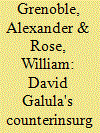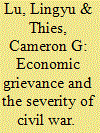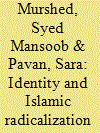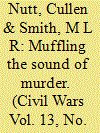| Srl | Item |
| 1 |
ID:
107889


|
|
|
|
|
| Publication |
2011.
|
| Summary/Abstract |
This article applies David Galula's theory of counterinsurgency to help explain the failures and successes in Colombia's counterinsurgency efforts against las Fuerzas Armadas Revolucionarias de Colombia, or the Revolutionary Armed Forces of Colombia (FARC). The case study demonstrates the continuing utility of Galula's ideas which, in their parsimony, highlight most of the important causal factors that account for dissimilar outcomes in the Colombian conflict. Colombia's divergent responses to the FARC throughout the history of the insurgency demonstrate both the detriment of improper strategy and the progress that can be achieved when Galula's laws are utilized.
|
|
|
|
|
|
|
|
|
|
|
|
|
|
|
|
| 2 |
ID:
107883


|
|
|
|
|
| Publication |
2011.
|
| Summary/Abstract |
This article examines the relationship between economic grievance and the severity of civil war. Theoretically, we create a testable micro-foundation for the association between economic grievance and conflict intensity. We argue that grievance does not lessen after the onset of civil war. Rather, pent-up grievance aggravates violence during the war. The more relative deprivation there is prior to the conflict, the more deadly and violently participants are expected to behave on the battlefield. This proposition is tested in a statistical analysis using the Armed Conflict Dataset (1960-92). Empirically, we demonstrate that economic grievance makes civil war more deadly. This effect is independent of the effect of ethnic grievance.
|
|
|
|
|
|
|
|
|
|
|
|
|
|
|
|
| 3 |
ID:
107891


|
|
|
|
|
| Publication |
2011.
|
| Summary/Abstract |
This article details the argument for the economic origins of the secessionist challenge posed by Indonesia's four resource-rich regions. The desire of rich regions to retain their own wealth conflicts with the national goal of sharing social welfare for equitable development across the country. The grievances of relative deprivation and aspiration to inequality were related to the distribution of resource rent by the autocratic regime of Suharto. Democratic transition opened up political space in which the resource-rich regions addressed their grievances, pushing the country to the edge of disintegration. The main policy response to the problem was decentralisation as part of the overall democratisation process. The policy has been successful so far in achieving its political objective; however, in the long run, people of the rich regions may be disillusioned because there is a risk that the supposed economic benefits of decentralisation may not materialise.
|
|
|
|
|
|
|
|
|
|
|
|
|
|
|
|
| 4 |
ID:
107886


|
|
|
|
|
| Publication |
2011.
|
| Summary/Abstract |
This article argues that both socio-economic disadvantage and political factors, such as foreign policy of the West about the Muslim world, along with historical grievances, play a part in the development of Islamic radicalized collective action in Western Europe. We emphasize the role of group identity-based individual behaviour in organizing collective action within radicalized Muslim groups. Inasmuch as culture plays any role at all in radicalization, it is because individuals feel the imperative to act on the basis of their Muslim identity, something to which different individuals will attach varying degrees of salience, depending on how they place their Muslim identity-based actions in the scheme of their multiple identities. We also emphasize the role of the opportunistic politician, from the majority European community, in fomenting hatred for Muslims, which also produces a backlash from radicalized political Islam. We present comparative evidence of socio-economic, political and cultural disadvantage faced by Muslim minorities in five West European countries: Germany, the UK, France, Spain and the Netherlands.
|
|
|
|
|
|
|
|
|
|
|
|
|
|
|
|
| 5 |
ID:
107885


|
|
|
|
|
| Publication |
2011.
|
| Summary/Abstract |
Zimbabwe's military intervention in the Democratic Republic of the Congo between 1998 and 2002 has not been analysed in detail. Scholars have either taken the ruling Zimbabwe African National Union - Patriotic Front (ZANU-PF) regime at its word or been too distracted by Zimbabwe's domestic turmoil to cast a critical gaze on what must rank as one of Africa's most disastrous military interventions. This article addresses this lacuna by discussing three aspects of the intervention: Zimbabwe's motives; the military's performance in the Congo; and ZANU-PF's efforts to obscure the reality of the intervention from the Zimbabwean public. While Zimbabwe's motives were more nuanced than many scholars acknowledge, the military's performance in the conflict was an unmitigated failure borne of poor training and leadership, corruption, weak allies and poor strategic choices. At home the intervention wrought a generation of veterans infected with acquired immune deficiency syndrome (AIDS), a bankrupt exchequer and a military thoroughly depleted by an unnecessary war.
|
|
|
|
|
|
|
|
|
|
|
|
|
|
|
|